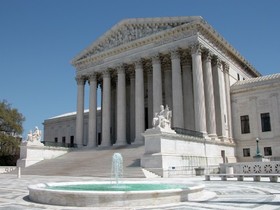The number-one trafficked blogger, Glenn Reynolds, actually takes a stand, but it’s from a dusty playbook:
BUSH SLAMS HISTORICAL REVISIONISTS ON THE WAR: About time.
The White House needs to go on the offensive here in a big way — and Bush needs to be very plain that this is all about Democratic politicans pandering to the antiwar base…
First of all, what’s a "politican"?
Second of all, Glenn needs to stop ogling the coeds at the University of Tennessee, and pick up a paper once in a while. If he did, he might realize that the antiwar base isn’t just a subset of angry Democrats led by Michael Moore and Dan Rather. Or whatever he seems to think.
Heck, even the latest Fox News poll shows that a mere 39% of Americans think that they will view the Iraq War as "worth it" five years from now. That’s pretty close to what Pew found recently as well (39% "worth fighting"; 60% "not worth fighting"). Is the "Democratic" antiwar base comprised of 60% of the country? Does it now include Pat Buchanan and Brent Scowcroft?
…that it’s deeply dishonest, and that it hurts our troops abroad.
Oh, Lord. Not that again! "Opposing the war only hurts our troops" — can’t we give that a rest? Does that even make sense to anybody anymore?
What are our soldiers — a bunch of pansy-ass approval-seekers? Do we train them to do their missions, or don’t we? Are they really going around saying, "Gosh, I’d really like to shoot back at that insurgent who is shooting at me, but I’m just not motivated anymore, thanks to the antiwar people back home. I think I’ll stand in the middle of the street." Puh-lease.
Besides, I tend to think that bullets and bombs hurt our troops abroad more.
And yes, he should question their patriotism. Because they’re acting unpatriotically.
Yeah, that makes sense. The President of the United States should question the patriotism of 60% of the country, including a majority of independents and many in the Republican party who oppose the war.
Such a tactic would also include questioning the patriotism of many Iraqi war veterans themselves. Nice thing to advocate on Veteran’s Day, Glenn.
UPDATE: Glenn updated his post — not to fix "politican" — but to include this quote from a reader:
Ending the Gulf War — and by democratizing, aiding the prosecution of the war on terror — was always about Iraq and the despotic government its authoritarian culture made possible.
"Smoking gun"? "Imminent threat"? "Links to al Qaeda"? "Mushroom cloud"? "WMD"? "Nigerian yellowcake"? Any of these terms ring a bell?
It’s ironic that Glenn applauds Bush for attacking "historical revisionism", and then cites with approval a revisionist rationalization for why we went to war in the first place.
UPDATE: Glenn is the gift that keeps on giving. In response to another reader asking Glenn to define "patriotism" (presumably to understand why "unpatriotic" only applies to antiwar people), Glenn responds:
I think it starts with not uttering falsehoods that damage the country in time of war, simply because your donor base wants to hear them.
Patriotic people could — and did — oppose the war. But so did a lot of scoundrels. And some who supported the war were not patriotic, if they did it out of opportunism or political calculation rather than honest belief. Those who are now trying to recast their prior positions through dishonest rewriting of history are not patriotic now, nor were they when they supported the war, if they did so then out of opportunism –which today’s revisionist history suggests.
So, to recap:
(1) "Patriotic" people can be for or against the war.
(2) "Unpatriotic" people can be for or against the war.
(3) But changing your views about the war to appeal to your antiwar donor based is "unpatriotic".
I think the word Glenn really wants to use here is "unprincipled", not "unpatriotic". But what the hell. Any ad hominem attack in a storm.
One has to wonder, though, how Glenn views war supporters who have changed their views about the rationale for the war over the past couple of years. Unprincipled? Unpatriotic?Constitancy about why we waged war against Iraq is not the Bush Administration’s strong suit. Neither is credibility.
And while I’m on it, is it so bad for an elected leader to listen to, and adjust his views in accordance with, the people he represents? What kind of a democracy do we live in where it’s actually considered "unpatriotic" for members of Congress to move in lockstep with the will of the electorate??
Finally, Glenn closes (for the time being) with this Rove ass-kissing sentence:
The desire of so many on the left to relive the Vietnam era is Karl Rove’s secret weapon.
Yeah, yeah, yeah. Heard those comparisons before. For two years. If it’s so true, when’s Rove going to use that weapon? Does the weapon have a child safety lock?
Besides, Rove would be well-advised to think before he shoots. It’s one thing to paint the the antiwar left as a bunch of ex-hippy Michael Moore wannabes. When the antiwar crowd was comparatively small, and had no real voice, it’s an easy shot.
But antiwar sentiment is now middle America, baby. It comes from all segments of the population. Rove fires that "weapon" and he might end up with a face full of buckshot. Not a pretty picture when you’re already on thin ice.



 Apparently, if I were home watching cable television news, I would be bombarded with the story about an 18 year old named Dave Ludwig, who killed the parents of his 14 year old girlfriend (Kara Borden), after which the two of them went fleeing in Martin Sheen/Sissy Spacek "Natural Born Killers" mode.
Apparently, if I were home watching cable television news, I would be bombarded with the story about an 18 year old named Dave Ludwig, who killed the parents of his 14 year old girlfriend (Kara Borden), after which the two of them went fleeing in Martin Sheen/Sissy Spacek "Natural Born Killers" mode.
 I had
I had